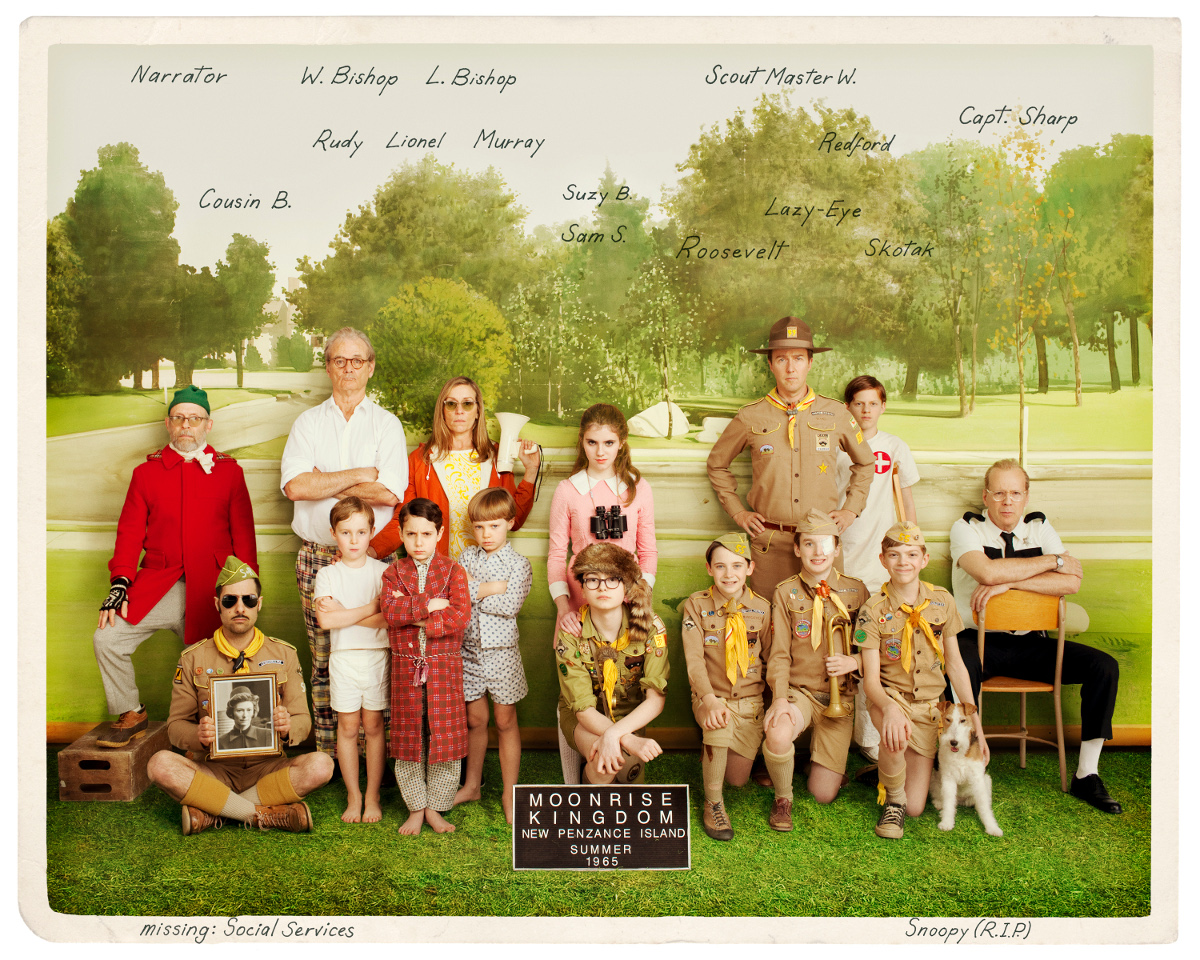Wes Anderson
Moonrise Kingdom
17/09/12 13:00 Filed in: Indochine | Movie Review
 There’s a great line in Rushmore when Rosemary is counseling Max Fisher after he’s feigned injury and climbed through her bedroom window to get close to her. Comparing her dead husband, Edward Appleby, to Bill Murray’s Herman Blume, she says: “Edward has more… imagination in one fingernail than Herman Blume has in his entire body.” Well, that line could very well be applied to Wes Anderson, who is in full force and effect in Moonrise Kingdom. Moonrise is about Sam, an orphan who has been disowned by his foster parents for consistently aberrant behavior, and Suzy, a well to do, strong willed young lady who is at odds with her family. Sam is a Khaki Scout and survivalist of sorts and with his training, the two set off together into the wilderness. Their adventure forms the first act of Moonrise. It’s really something to see the culmination of Wes Anderson’s filmmaking efforts over the past 15 years in this movie. His sense of color, odd timing with dialogue, and overall unique style are all on display here. Anderson is one of those people who was truly meant to do this. It would be a waste if he did anything else.
There’s a great line in Rushmore when Rosemary is counseling Max Fisher after he’s feigned injury and climbed through her bedroom window to get close to her. Comparing her dead husband, Edward Appleby, to Bill Murray’s Herman Blume, she says: “Edward has more… imagination in one fingernail than Herman Blume has in his entire body.” Well, that line could very well be applied to Wes Anderson, who is in full force and effect in Moonrise Kingdom. Moonrise is about Sam, an orphan who has been disowned by his foster parents for consistently aberrant behavior, and Suzy, a well to do, strong willed young lady who is at odds with her family. Sam is a Khaki Scout and survivalist of sorts and with his training, the two set off together into the wilderness. Their adventure forms the first act of Moonrise. It’s really something to see the culmination of Wes Anderson’s filmmaking efforts over the past 15 years in this movie. His sense of color, odd timing with dialogue, and overall unique style are all on display here. Anderson is one of those people who was truly meant to do this. It would be a waste if he did anything else.At the conclusion of act one, Sam and Suzy are caught and separated (albeit very briefly). Sam is informed that he can’t go back home and that social services may give him over to a mental hospital where he is likely to receive electroshock treatment (the movie takes place in the 60s). While he awaits the arrival of Social Services, he stays with the island police officer, played impressively by Bruce Willis. The two develop a rapport during their brief time together, but soon Sam and Suzy escape again with the help of Sam’s boy scout troupe. The second adventure is rife with danger and drama, but it’s really the first one that will stick with you. Anderson has always been able to convey the sense that his character embody their own special universe, a sort of altered reality, and that’s what we get with Sam and Suzy’s first journey into the wilderness. It’s usually warm and cozy and filled with wonderment, but occasionally interrupted by stark violence (the death of snoopy, vivisection of the fish for supper). I’ll leave the rest for you to enjoy when you check this out at the movies or on DVD.
I will lodge one complaint. For a guy as good as Anderson at creating imaginative settings filled with unrealistic yet interesting and insightful characters, the utter lack of diversity in this movie is rueful. Are you telling me not one Asian American or black or Latino person applied to be cast as one of those boy scouts? I know this was set in the 60s on some remote island, but with the myriad of other implausibilites in this movie, Anderson could have thrown in a little diversity for goodwill’s sake. I’m just sayin’.
Comments
